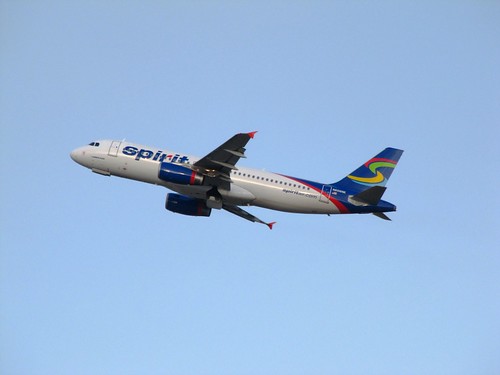Skift Take
Spirit responded to the DOT's 2011 ruling regarding fare disclosure by claiming in advertising that the higher prices were government charges as opposed to fees like tacking on for boarding passes or booking with a credit card.
Spirit Airlines was hit with a federal lawsuit that claims it misled passengers by implying that a usage fee was a government-required charge.
A Miami law firm has filed a class-action lawsuit against Spirit Airlines over fees that were allegedly baseless and misleading.
While the Miramar-based airline is famous for its abundance of extra charges — including for carry-on bags and seat selection — the suit focuses on “passenger usage fees.”
Spirit says on its website that those fees range from $8.99 to $16.99 each way; in regulatory filings, the publicly traded company says it charges those fees for sales on its website, by phone, and through travel agents in order to cover distribution costs.
The lawsuit, filed late Monday in the federal court’s South Florida district, claims that Spirit actively misrepresented the cost of airfare by making the usage fee appear to be a government-required tax or charge.
“By means of omissions and misrepresentations, Spirit misleads consumers to believe that the [passenger usage fee] is an official government tax or fee when, in reality, the fee is nothing more than additional airfare because Spirit does not provide any bona fide service in exchange for the [fee],” the suit says.
Through a spokeswoman, Spirit denied the claims.
“Spirit believes the claims are without merit and intends to defend the case,” spokeswoman Misty Pinson said in an email Tuesday.
Katherine Ezell, an attorney at Podhurst Orseck who is representing the plaintiffs, said that while one named class member is included in the suit — a New Jersey businessman — more will be added. The law firm estimates that as many as 20 million passengers could have been affected by the fees over the past four to six years.
Spirit advertises base fares as low as $9 while making money in fees it describes as optional. Reporting second-quarter financial results last month, the airline said average ticket revenue per passenger flight segment was $81.06, a decrease of 1.1 percent compared to the previous year. Non-ticket revenue per passenger flight segment, on the other hand, increased 18.6 percent over the previous year to $51.47.
“Spirit has continued its strategy to offer low base fares while increasing revenue from non-ticket sources,” the company said in its earnings release.
(c)2012 The Miami Herald. Distributed by MCT Information Services
![]()
The Daily Newsletter
Our daily coverage of the global travel industry. Written by editors and analysts from across Skift’s brands.
Have a confidential tip for Skift? Get in touch
Tags: fees, legal, spirit airlines

